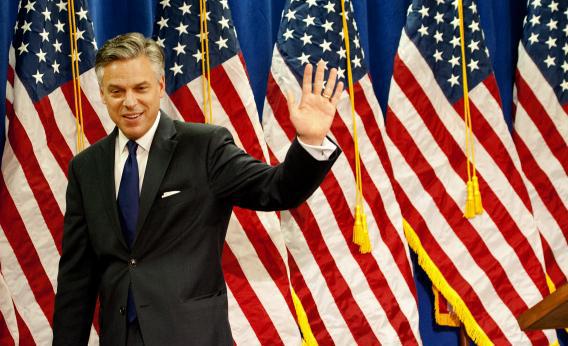A week ago, Jon Huntsman said Mitt Romney represented the divisions that are tearing the country apart. Today he endorsed him. “I believe it is now time for our party to unite around the candidate best equipped to defeat Barack Obama. Despite our differences and the space between us on some issues, I believe that candidate is Governor Mitt Romney.”
Nevermind.
It’s common for trailing candidates to unleash their harshest attacks on their opponent in the last desperate moments of their campaign—and then to immediately turn around and endorse them. This may be “just politics,” but you can understand why it’s always a way politicians disappoint us: Were you sincere in your denunciations, or are you sincere in your endorsement?
But voters—especially conservative voters—shouldn’t get too smug about deploring Huntsman’s reversal. His about-face—like Tim Pawlenty’s before him—is a preview of the reversal that conservatives are going to have to make if they are going to support Romney as the GOP nominee in order to defeat Barack Obama. This is the underlying contradiction at the heart of a campaign in which candidates insist that they are sincere, and voters insist they are looking for sincerity. Despite all the focus on principle, constancy, and truth-telling from politicians, the whole thing concludes with a Big Nevermind and everyone clambering on to the bandwagon.
It’s not just Republicans who are insincere. The Obama campaign once held a press conference arguing that Hillary Clinton was unfit to be commander in chief because she had embellished a story about landing under gunfire in Bosnia. What was once an irredeemable flaw was forgotten when Obama made her his secretary of state.
The likely eventual capitulation of all of Romney’s rivals gives the ongoing campaign an air of unreality. Perry, Gingrich, and Santorum are all engaged in a competition to show that they are the most honest and trustworthy. Believe them when they promise to end Obamacare, and believe them when they offer new explanations for why Mitt Romney is unfit for the nomination. Yet they will all very likely be forced to wiggle out of those denunciations if he is the nominee. They know this, but they also know that only Democrats will hold them to account on this.
Though they occupied a similar ecological niche—relatively moderate, handsome, rich, Mormon, former governors—Huntsman and Romney were more than just rivals. They didn’t seem to like each other. Romney didn’t let Huntsman’s critiques roll off his back they way he did with other candidates who had a better chance of actually defeating him. In the back-to-back debates before the New Hampshire primary, they had a set of testy exchanges. In a rare unforced error, Romney denigrated Huntsman’s service in the Obama administration. Huntsman took umbrage. When Romney didn’t back down, Huntsman responded to moderator David Gregory: “This nation is divided, David, because of attitudes like that.” It was one of Huntsman’s biggest applause lines. In subsequent days it got hotter. Huntsman, who once said you didn’t “need to run down someone’s reputation” in a presidential campaign, said that Romney was unelectable and “likes to fire people.”
Huntsman maximized his leverage by getting out now. He was barely registering in the polls in South Carolina. He was never going to improve on his third-place showing in New Hampshire. If he’s ever going to run again, this selfless act will help brand him as a reasonable Republican who puts party first. Also, if he dropped out after a dismal South Carolina showing, he’d be just another casualty along with Rick Perry.
Romney thanked Huntsman for his support, but he didn’t fall all over himself. For all of the accusations about Romney’s inauthenticity, he did the least you can do without appearing ungracious. “I salute Jon Huntsman and his wife Mary Kaye. Jon ran a spirited campaign based on unity not division, and love of country. I appreciate his friendship and support.” That was it. When a politician says he appreciates your friendship in this context, it is as meaningful as him saying he appreciates your fine spelling. Romney didn’t appear at a unity rally with Huntsman and didn’t call in the cameras so his statement about the endorsement could air on the evening news.
Parties require the Big Nevermind in order to unify against the bigger threat—the other party. It is just one of the ways in which compromise is written into the political process. When parties don’t have a coming together moment—as with Ted Kennedy’s fussy grudge against Jimmy Carter in 1980—it can be distracting and potentially debilitating. If party regulars don’t agree to overlook their nominee’s faults, they risk overlooking the nominee.
